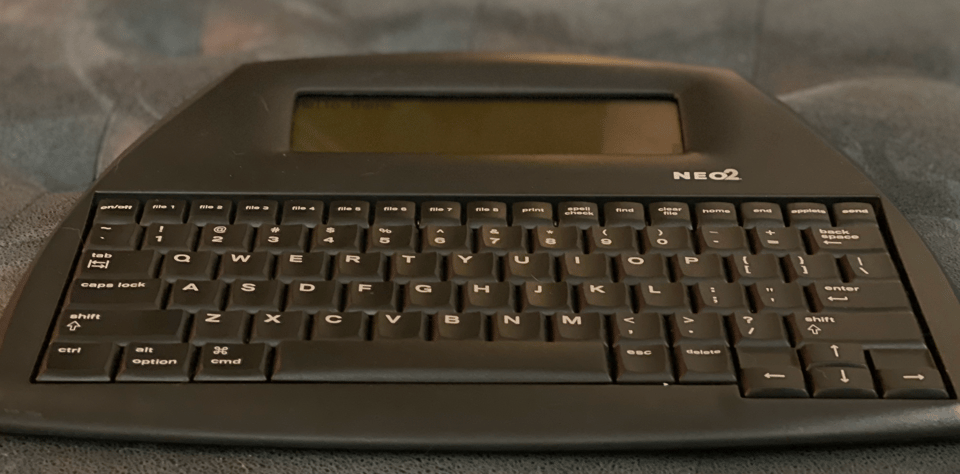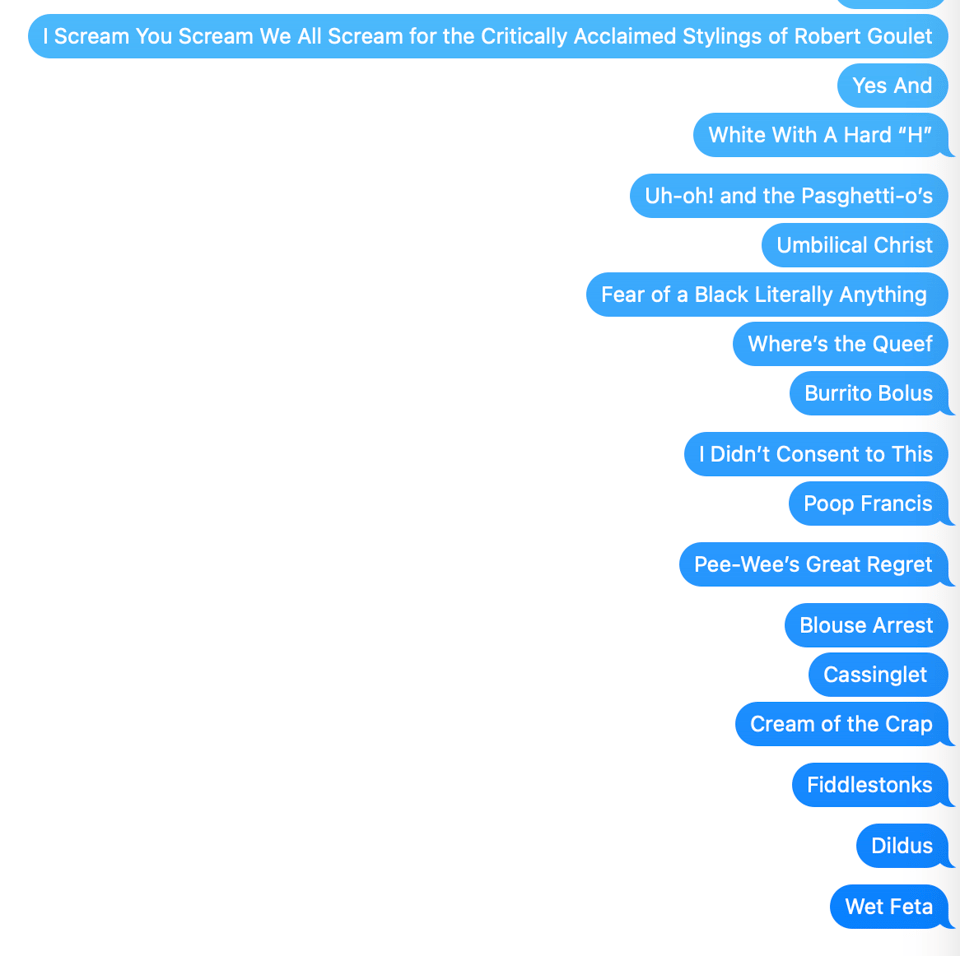The Lying Machine
Hello!
Lately, I’ve been thinking about writing comics again. After a year or so of slow going, three solid ideas have been banging around in my head, begging for further development. But I’ve had a hard time sitting down and writing those ideas out, and I decided that part of the problem is that it feels weird to write fiction on the same laptop that I use for my day job and my freelance pieces.
I’ve been thinking for a little while about distraction-free writing devices. I wanted a device specifically devoted to writing fiction–a kind of playground where I can shake off the non-fiction writing habits I’ve developed over the past 20 years and just go hog wild. When writing heavily researched non-fiction, I have to stay connected to the internet so I can link back to sources and weave transcripts of conversations into articles. But when I write fiction, it helps to have a device that just allows me to write–to barrel forward and not worry about structure, or plot holes, or errors.
A friend of a friend was kind enough to provide me with a loaner device–a Freewrite Traveler. Freewrite has become the premium brand of distraction-free writing. They began with a crowdsourced futuristic typewriter–a $650 fancy keyboard with an e-ink screen that automatically saves everything in the cloud but doesn’t offer internet access. The Traveler is a smaller, more portable version of that device: It’s a satisfying keyboard, a small e-ink screen, and an internet connection that continuously saves everything typed on the keyboard to Google Drive or Dropbox or the cloud-based word processor of your choice.
I wanted to like the Traveler, but there was one huge problem for me: The e-ink screen renders words slower than I can type. Even when I’m just barreling forward and getting words on paper, my inner copyeditor demands that I fix obvious typos as I go, and with the e-ink screen whenever I mistype I have to wait for the screen to finish rendering before I can see and correct what I typed. This completely kills the rhythm of my process.
Ultimately, I realized that I was unfavorably comparing the Traveler to a device that I had previously owned: The Alphasmart Neo2. Alphasmart was a company that produced simple, distraction-free writing devices–basically a sturdy keyboard attached to a simple LED screen. With just a couple of AA batteries, you could write tens of thousands of pages that would be automatically stored on the device. When it came time to edit, you just attach the Neo2 to a laptop with a USB cable, open a Word document, and then push “send” on the device, which then dumps everything on your Neo2 into the document.
I loved my Neo2. It helped me through several National Novel Writing Months, allowing me to write over a hundred thousand words with relative ease. But eventually I got a job writing for a newspaper, and I set the Neo2 aside. When I eventually returned to the device, something inside of it had broken, and it was essentially a paperweight. And Alphasmart went under in 2013, making a replacement unlikely.
Freewrite recently debuted a new distraction-free device called the Alpha, which is an obvious attempt to appeal to fans of the Neo2. Like the Neo2, the Alpha also features an LED screen and a simple, no-frills aesthetic. But some reviews indicate that the keyboard of the Alpha isn’t great, and it also suffers from a weird lagging problem that makes typing documents longer than 3000 words or so very difficult.
At the same time, while Googling around, I happened to notice that eBay is full of a vibrant community of Neo2 fans who are refurbishing and selling the old Alphasmart devices for a hundred bucks or less. And that’s how I wound up with my second Alphasmart Neo2, which I’m testing by writing these very words that you see before you right now.

Reader, I love her.
Probably my appreciation for the Alphasmart stems from the fact that it looks like a cousin of the clunky Commodore 64 that served as my introduction to the world of word processing. It’s a textured rounded mound of plastic with a clicky mechanical keyboard, and the screen feels like a throwback to digital dictionaries and other weird technological doodads of my youth. But this thing really works for me. It’s a place for me to write, to dump my thoughts into a text file without judgment or self-consciousness. Editing comes later. For now, this thing is my fiction-writing machine, a place to lie and daydream and make shit up with no consequence. It feels like freedom.
I've Been Writing
For a special moviegoing package in the Seattle Times, I contributed a little roundup of books about movies and novels set in the movie business that readers can enjoy as they’re getting back into leaving the house to watch movies in theaters again.
I also highlighted some of the best-looking paperback releases of the month.
This month, Seattle author Dustin Kiskaddon published his memoir Blood and Lightning, about his time as an apprentice in the tattoo industry. I talked with him about his experiences and other broader issues affecting tattoo culture–for instance, how Instagram is making tattoos more homogenous from city to city. As someone with exactly zero tattoos, this was a super-interesting book offering a look into a world I know absolutely nothing about.
I also talked about my neighborhood bookstore, Third Place Books Seward Park, and how it’s living up to the very complex challenge of serving as the neighborhood bookstore for the entire 100,000-person-strong, incredibly diverse population of South Seattle.
I've Been Reading
Whalefall has a lot going for it. Broadly, it’s a Chrichtonesque thriller packed with trivia and information about deep sea diving and ocean life. More specifically, it’s a novel about a man who gets accidentally eaten by a whale and has to fight his way out. If that’s not enough of a premise to draw you in, I don’t know what to tell you. Unfortunately, a lot of the book is taken up with the emotional challenges of its protagonist, a young diver who is trying to measure up to the memory of his revered ocean-diver father. And it’s honestly kind of hard for me to care about some guy’s daddy issues when he’s trying to fight his way out of a motherfucking whale. Someone is going to try to make this book into a movie and that movie will probably suck but I will definitely watch it because I am enthralled by the idea of someone fighting his way out of the inside of a whale.
Normal Women is a novel about a young mother who falls under the thrall of a charismatic cult leader who may or may not also be a pimp. I was into this book, but I did find the earliest passages to be a bit of a chore–I’m just sick of novels about married couples that absolutely loathe each other and are miserable in their relationships. Yes, couples get divorced all the time and some people are genuinely unhappy in their terrible relationships. But there’s a certain kind of whiny, absolute unhappiness that occurs frequently in novels and only in novels, and it feels both unrealistic and cliche. Why are all unhappy couples in modern fiction unhappy in the exact same way?
Molly Roden Winter’s More is a memoir about how she and her husband opened their marriage. Every once in a while I read books about open relationships and polyamory in an effort to try to understand the appeal. This book probably came closest to helping me understand why someone would be interested in an open marriage–Roden Winter writes in one passage that she loves the shiny-new person feeling that you get from being in a new relationship and that she couldn’t imagine ever living without that feeling by staying in a monogamous relationship with one man for the rest of her life. That makes a lot of sense to me, and as someone who absolutely hates feeling like a shiny-new person in a new relationship (that part always feels forced, false, and uncomfortable), it explains why I’ve never thought polyamory seemed like a good idea. If you’re into sparkling small talk and impressing new people at parties, maybe polyamory is for you!
Gaytheist is a memoir comic about growing up gay in a strict orthodox Jewish community. I really dug the peek inside an experience that is completely alien to me and while it feels like Lonnie Mann just kind of skims over the “atheist” half of the portmanteau-ed title—portmanteitle?—it’s certainly a powerful coming-out story.
Alice Sadie Celine is a novel about a mother who agrees to attend her daughter’s best friend’s play when the daughter is too busy to go. She and her daughter’s best friend fall in love and have an affair. The joy of this novel is waiting for the rug to be pulled out from all the characters, and it’s all handled very delicately. This isn’t a soap opera, it’s a prestige drama, if you catch my drift, and I appreciated the fact that every character seemed to be coming from a genuine place.
Maori author Sascha Stronach’s novel The Dawnhounds is a splendid bit of science-fiction worldbuilding, a story about a cop in a living city–everything, from the buildings to the weapons, are made of organic material–who comes back from the dead with mysterious magical powers. I generally have a hard time falling into fantasy stories and stories in non-earth settings, but this one won me over early and kept me interested all the way through.
Here’s a cliché for you: As soon as I turned 40, I found myself becoming increasingly interested in birds. I’m not a full-on bird-watcher, but I do tend to a birdhouse and I lose my breath a little bit whenever I spot a bald eagle. Hummingbirds were my entry into bird appreciation, and they still fascinate me more than any other kind of bird. Jon Dunn’s Glitter in the Green is a book about visiting hummingbirds in their natural habitats all around the world, and if you happen to be a 40ish-year-old person whose birding gene suddenly kicked in, you’ll find a lot to love.
For Free: Band Name, Never Used
A couple of weeks ago, a friend of mine texted me a picture of a band and asked me to guess their name. I spent the next hour coming up with appropriate names for a group of white dudes in their 20s with ironic mustaches, and it turned out to be a lot of fun. I genuinely like a few of these and I think it would be a shame for them to go to waste. So if you’re thinking of starting a band, I humbly offer this list to you free of charge:


You’re welcome!
Hope you have a great March.
Paul